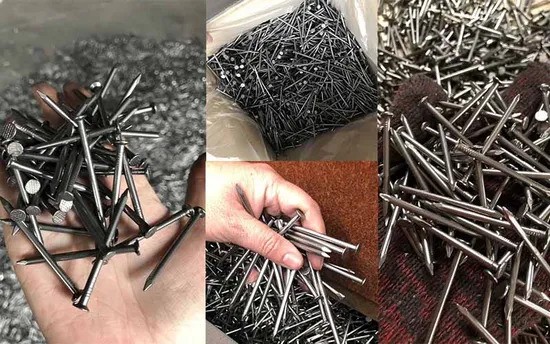Kenya’s construction industry is booming — from new estates and high-rise apartments to rural housing projects. With this rapid growth comes a massive demand for building materials, and one product that’s often overlooked but always in demand is iron nails (misumari).
Imagine running your own small nail factory, supplying hardware stores, construction companies, and roofing contractors across Kenya. The best part? You don’t need millions to start — just the right knowledge, consistency, and strategy. Let’s break it down.
How Iron Nails Are Made
Nail production is surprisingly simple. Nails are made from wire, which is cut, shaped, and polished using a special nail-making machine. The basic setup includes three main parts — a wire reel (drawing machine), the nail-making machine, and a nail washer.
You feed the wire into the machine, adjust settings for length and thickness, and within minutes, the machine begins producing nails of different sizes — roofing nails, common nails, U-nails, and steel nails. The process is straightforward, but learning through YouTube tutorials or local technical workshops can make it even easier.
Buying the Nail Making Machine
The nail-making machine isn’t commonly available locally, but you can easily import one from global marketplaces such as Alibaba, Made-in-China, or eBay. You may also find suppliers at international trade fairs like the Canton Fair in China.
A standard machine costs around Ksh. 400,000, and it can produce up to 700 nails per minute depending on the model. That’s a serious production rate for a small business setup.
If you plan wisely, you can even import directly with a group of other small-scale manufacturers to share shipping costs and taxes.
Getting Your Raw Materials (Wire)
The main raw material for nail production is low-carbon steel wire, preferably Q195 wire, which costs about Ksh. 30,000 per tonne. You can source this locally from metal suppliers or importers in industrial areas like Nairobi’s Industrial Area or Mombasa Road.
One tonne of wire can produce roughly one tonne of nails, giving you an excellent return once you process and package it.
Setting Up Your Nail Factory
For the location, you’ll want a space near a major town but with affordable rent and good transport links. Ideal areas include Ruiru, Kitengela, Mlolongo, Athi River, or Naivasha — all of which have industrial potential and access to major roads.
A small factory space should accommodate your nail machine, wire storage, packaging area, and finished product storage. Ensure the space has a reliable electricity supply, ventilation, and safety equipment (like fire extinguishers and gloves for workers).
Budget Breakdown
To start small, expect an initial investment of Ksh. 500,000 to Ksh. 1,000,000, depending on whether you import new or used equipment. This budget covers:
- Nail-making machine: Ksh. 400,000
- Wire raw material: Ksh. 30,000 per tonne
- Rent, setup, and permits: Ksh. 100,000–200,000
- Labour and utilities: Ksh. 50,000–100,000
- Packaging and branding: Ksh. 30,000
Once you’re operational, you can start with one or two employees and scale up as demand increases.
Profit and Sales Potential
Now for the exciting part — the numbers.
A 50kg bag of nails sells for about Ksh. 4,200. That means one tonne of processed nails can bring in around Ksh. 84,000 in sales.
If you manage to sell just one 50kg bag to 50 hardware shops per month, that’s Ksh. 210,000 in monthly revenue. With steady supply and strong marketing, it’s realistic to generate Ksh. 4–5 million annually.
And that’s just from one small setup! Many hardware shops and construction firms in Kenya import nails from China or India — meaning there’s room for local production to fill that gap.
Smart Ways to Grow Your Market
To increase sales, think beyond your neighborhood. Partner with:
- Roofing sheet manufacturers and hardware distributors.
- Real estate developers and construction companies.
- Online B2B platforms like Jiji, Shopit, or Kilimall for industrial buyers.
- Transport and logistics businesses to help with distribution.
Leverage digital marketing — create a Facebook or TikTok page showcasing your production process, packaging, and delivery. People trust visible, local manufacturers.
Final Word
Starting a small iron nail (misumari) factory in Kenya isn’t just about profits — it’s about taking part in Kenya’s industrial revolution. With the government encouraging local manufacturing under the “Buy Kenya, Build Kenya” initiative, this is the perfect time to get in.
With an investment starting from Ksh. 500,000, dedication, and smart marketing, you can build a consistent, high-demand business that supports the construction industry — and your financial independence.
The construction boom isn’t slowing down anytime soon — so why not be part of it from the ground up? Your first bag of nails could be your first step to becoming a Kenyan industrial success story.
